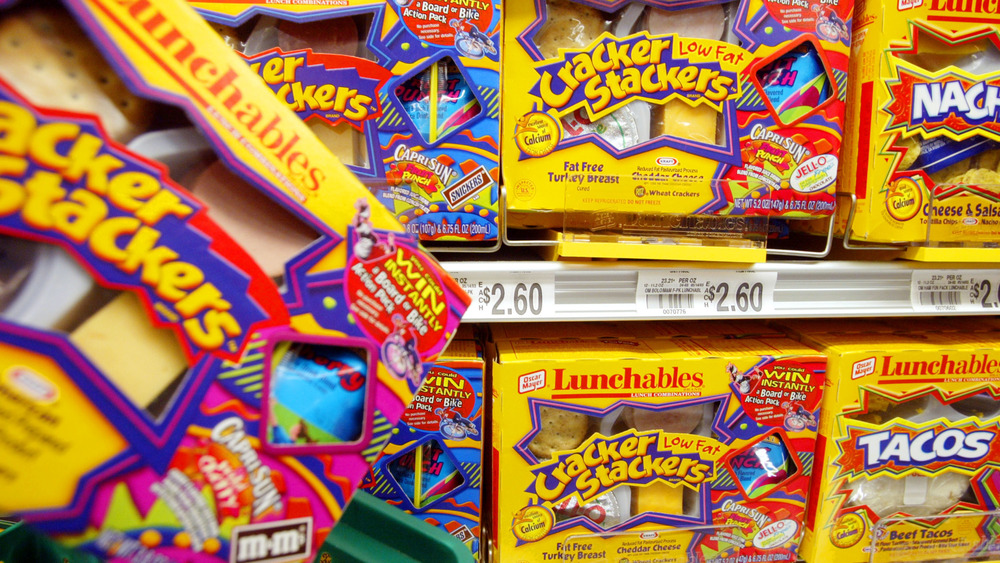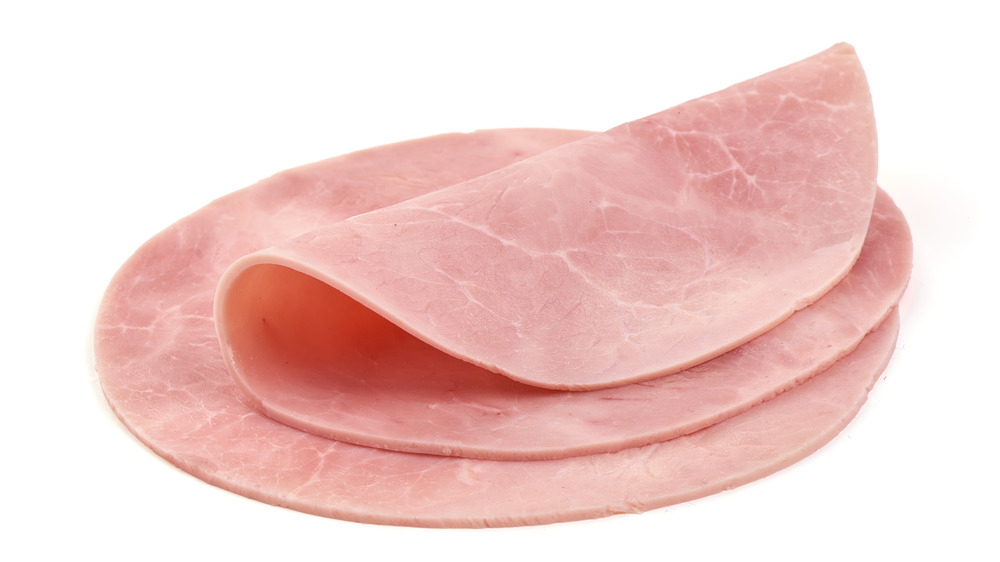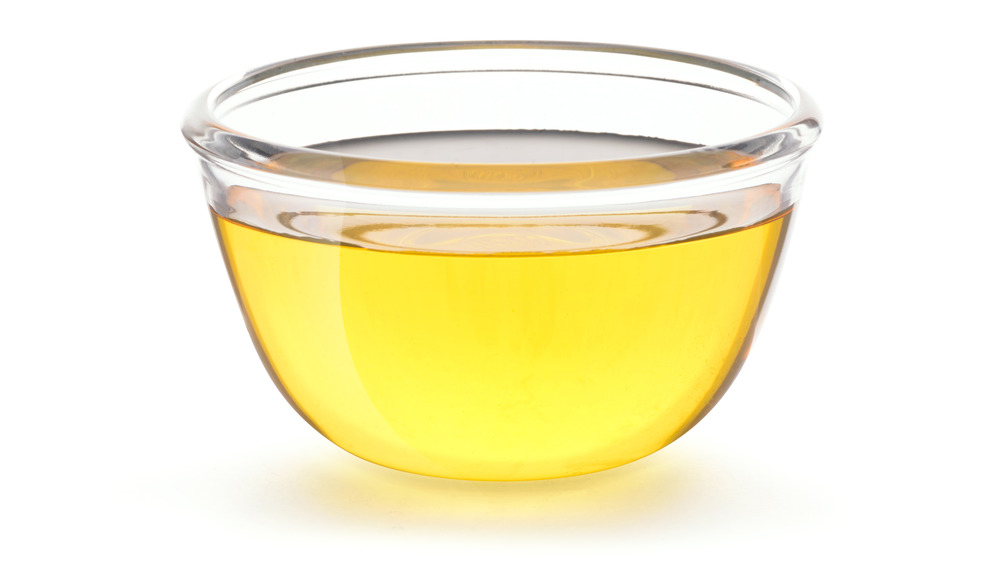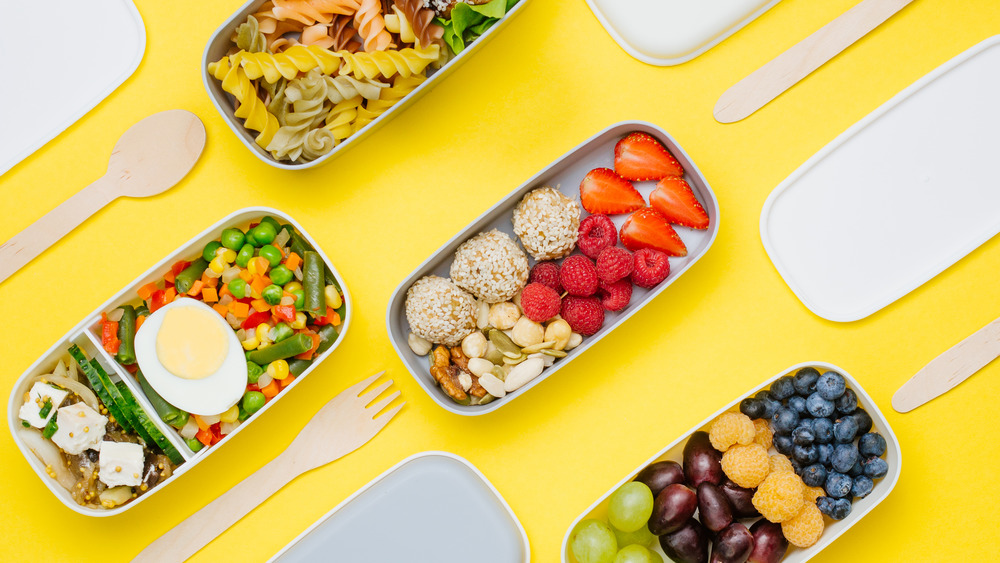What Makes Lunchables So Concerning
Lunchables! If you were a '90s kid (or an '00s one), there's a good chance you either packed these in your backpack or else envied your lucky classmates who got their own cute little box of bite-sized snacks. Unlike those classmates who were stuck brown-bagging healthy foods like cashew butter on whole grain, the kids with Lunchables were always highly sought-after trading partners during the complex negotiations that take place in every elementary school cafeteria. Because not every parent has the time or energy to go all-out to create a bento box packed with crudites and quinoa salad, some parents may wonder: Are Lunchables really that bad?
If you're someone who's regularly lunching on Lunchables, well, there's a thing or two you ought to know about this childhood favorite. Nutritionist and chef Serena Poon, the founder and CEO of wellness website Serena Loves, walked Mashed through a laundry list of Lunchables ingredients that may do far more harm than good.
All of the ingredients in Lunchables are highly processed
It will come as no shock whatsoever, should you take a look at the Lunchables ingredients list, to realize that just about everything contained in any given meal is some type of highly processed food. Poon, no fan of food that's far from its natural state, warns that, "processed foods, particularly processed meats and refined grains, can lead to inflammation, which can cause fatigue, depression, weight gain, and digestive problems amongst other symptoms."
The processed deli meats that many Lunchables include are of particular concern. The World Health Organization says that processed meats are classified as being carcinogenic to humans, citing epidemiological studies that show a clear link between consumption of such meats and the incidence of colorectal cancer. Not only the meats, but the crackers in Lunchables can also be seen as a health hazard. The refined carbs, as well as the oils and preservatives they contain, can trigger conditions such as arthritis (via Arthritis-Health).
Lunchables are high in unhealthy fats
One of the things that makes Lunchables so darn tasty is that they are loaded with fat. Some of this fat is saturated, which Poon says "is okay in moderation, but you want to be cautious about eating too much." If you consume a high amount of saturated fat, you might wind up with high LDL (bad) cholesterol levels, meaning you're at risk of heart attacks and stroke. Another kind of fat you might find in Lunchables is trans fats. While this nothing-but-bad-for-you additive is actually banned in larger amounts (via WHO), Lunchables sneak it in amounts below the FDA's forbidden level of more than .5 grams. While it may not be illegal to serve up such tiny amounts of trans fats, Poon emphasizes that "no amount is considered safe."
Even the plant-based oil used in Lunchables isn't all that great. While Poon claims that "palm oil is not terrible to consume in moderation," it still contains a level of saturated fat similar to that found in coconut oil. What's even worse, though, is the impact that palm oil harvesting can have on the environment. The World Wildlife Fund notes that palm oil plantations can have a devastating impact on the rainforest and all the endangered animals (and humans) that call this environment home. Poon advises that palm oil "should generally be avoided unless you are absolutely certain that it was sourced ethically."
Those high levels of sodium, sugar, and preservatives in Lunchables won't do you any favors
Lunchables are on the high side when it comes to sodium content, typically containing almost 700 mg of this nutrient, which Poon points out is nearly one-third of your day's recommended maximum. The CDC advises not exceeding 2,300 mg per day, but this isn't always easy to do. "Hidden sodium is really common in all packaged food," Poon explains, telling Mashed that, "it's important to monitor your intake if you eat these foods." Poon says that a diet too high in sodium can cause high blood pressure and increase the risk of heart attacks and stroke. Many Lunchables also contain some type of dessert or sweet drink, and these contain added sugar that can lead not only to weight gain, but also diabetes and heart disease.
Additional concerning ingredients are all of the preservatives needed to make Lunchables relatively shelf-stable — although they're found in the refrigerated section of the supermarket, the manufacturers are well aware that they may spend half the day in an unrefrigerated cloakroom. Poon says that while all of the chemical food preservatives they contain have been recognized as generally safe by the FDA, she cites studies that have linked them to ADHD (via PubMed), digestive difficulties (via PubMed), and cardiovascular disease (via PubMed).
How to pack a healthy lunch alternative
Yikes! Who knew Lunchables could be downright dangerous? Empty calories are one thing, but food that could actually make you sick? Yeah, best to try to wean yourself off that, but how? Poon has some suggestions as to how you can make your own "healthy, protein and calcium-filled ... snack pack at home." She recommends using seeded crackers to replace the more processed kind, and using nuts as a replacement for more processed forms of protein. (For non-vegans, a chunk of non-processed cheese, a boiled egg, or some leftover rotisserie chicken would work, too, though the last option would require refrigeration.) Either kale or broccoli would add some fiber and calcium to the meal. For dessert, Poon would permit a small amount of dark chocolate. "This easy to pack meal," she says, "will supply the macronutrients, phytonutrients, antioxidants and fiber that your body needs to thrive."
The best part about it is, if you pay a little attention to the ingredients and do some label-reading, you can customize it to your own specifications with your preferred healthy food items of choice. All you need is a cute little sectioned box, and you'll be all set to snack sensibly.




